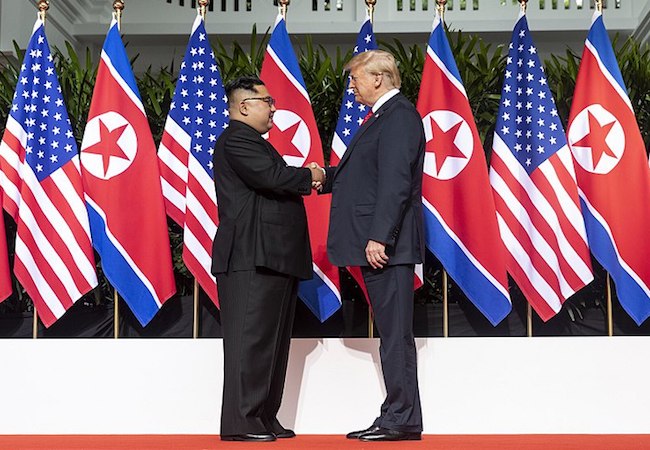Singapore summit: Challenges and prospects

By Beenish Altaf
A country that was once strongly frowned upon, that was reason for the heightened global concern for nuclear buildup, is now being appreciated for its diplomatic panache to the extent that the US decided to change its decisions favoring that state. President Donald Trump, just a day ago, reversed its decision of military exercises with South Korea by calling it a “waste of money”.
This is in the backdrop of a Summit held on June 12, 2018 between the US and North Korea in Singapore. Since the Prime Minister of Singapore Lee Hsien Loong welcomed the meeting open-heartedly, the role of the country, is fairly vital in carrying out parlays among both the leaders i.e. North Korean Kim Jong-un and the US Donald Trump. It is believed to be the first remarkable deal in many years among both the countries. Regarding its agenda, largely denuclearization has been on the top most priority list in the summit; however, its outcomes could not be assessed before time. Some are anticipating the hopeful outcome seeing it as a good step for building favorable relationship between the US and North Korea, while others are apprehensive of it. Paradoxically, the country habitual of military solutions i.e. the US, is evidently foreseeing a “good feeling” for North Korea this time; with reference to the June’s summit.
The daily newspaper “Rodong Sinmun” of Pyongyang on the other hand claims that this summit will establish a permanent and peaceful regime in the Korean Peninsula and to solve problems that are of common concern, including issues to realize the denuclearization of the Korean Peninsula.
Formerly relationship between the US and North Korea has remained on the edge and tensed to the extent of exchanging harsh and threatening statements to each other at the state level. It was followed by several missile tests from North Korean side, which up till now conducted six nuclear tests too (the latest was in September 2017). North Korea offered a frightening and alarming demonstration in the preceding months of acquiring the capability to deliver warheads, using missiles that could easily strike South Korea, Japan and the United States territory. It was actually to exasperate the US plan of installing anti-missile defence system in the South, which resulted in further evoked concerns in the North Korean.
Pakistan always condemned North Korean nuclear ambitions because it damages the global objective of making Korea a nuclear weapons free peninsula. More precisely, all that Pakistan wants is peace in Korean Peninsula. It was always desired that all the countries in the region including North and South Korea, Japan, China and the US, manage the situation diplomatically with utmost responsibility.
However, if looked at with the lens of a victory, several conclusions could be drawn including: a durable peace is anticipated as the best outcome in terms of this summit as North Korea is now trying to develop good ties with South Korea. Supreme leader, Kim met President Moon Jae-In and discussed areas of mutual interests. Besides, the summit could be a step-up for international community’s disarmament goal that is the denuclearization of Korean Peninsula, ironically, the time frame of which cannot be measured at this point of time. Another gain for North Korea could be the removal of sanctions from the American side that will be a further aid in the development of good bilateral relations.
Despite mutual optimism, analysts on both sides are of the view that it is too early to call it a win-win summit. A big concern is the method or details about how to verify the North Korean compliance. An agreement toward no more nuclear or missile testing or rockets flying is needed. The summit gives North Korean leader a status of a credible leader to which President Trump justifies as a part of its long-term strategy that will eventually lower the level of tensions with North Korea. He said, “I went there, I gave him credibility….I think it is great to give him credibility.”At large it could be summed up in the hope that Washington wants to achieve a major disarmament goal by North Korea within the next two and a half years, within Trump’s current presidential term, which ends on 20 January 2021.




